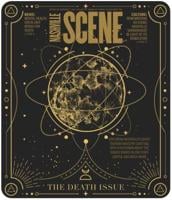
Da 5 Bloods
Let’s get revolutionary in tone, shall we? As always, see some recommendations for streaming titles below, and check out the past 13 issues of the Scene for lots more suggestions: March 26, April 2, April 9, April 16, April 23, April 30, May 7, May 14, May 21, May 28, June 4, June 11 and June 18.
Da 5 Bloods on Netflix
It’s always a good time for a new Spike Lee movie, and like all his best work (and even some of his less successful films), Da 5 Bloods is a heaping buffet of everything — it’s rich with ideas, motifs, aspect-ratio shifts, finely tuned perspectives, and big, careening sledgehammer blows. Four Vietnam vets return there to retrieve the remains of their squad leader (and the intercepted gold they buried until the heat was off). They’re coming to terms with their identities, the American response to the Vietnam War (as well as what it means to be a Black soldier for American interests) and how the intervening decades have changed them. This movie is messy and awesome, and Lee has never made anything that wasn’t absolutely relevant to whatever was going on in the world. I wish Netflix had been as free-flowing with the effects budget for this as the company has been with other projects (there’s some dodgy blood spatter and helicopter appearances that clang, even though they cannot break the film’s spell). Delroy Lindo is great, but Clarke Peters and Chadwick Boseman steal the whole thing — and two-and-a-half hours fly by. Also, if you dig co-star Van Veronica Ngo’s turn in this film and would enjoy seeing some human traffickers get their asses demolished, her merciless action epic Furie is also streaming on Netflix right now.
Tongues Untied on Kanopy
Marlon Riggs’ documentary about the Black gay experience was considered scandalous enough in 1989 that our local PBS affiliate (as well as several other affiliates throughout the country) refused to air it. Constructed with interviews, poetry and a central thesis exploring the lack of intersection and awareness in Black and queer communities at that time, it’s still an essential document today. None of the issues Riggs raises has become irrelevant over time, and it’s always overwhelming when one finally gets to see some of the art that was weaponized and wielded against domestic arts funding. This film so scared the first Bush administration and its reactionary toadies — like Pat Buchanan, Donald Wildmon and Jesse Helms — that they set about tanking the NEA because of it. Kanopy, if you aren’t familiar, is a streaming platform for public libraries and universities. Shirley Clarke’s Portrait of Jason, currently streaming on Criterion, is also an essential document in the history of Black queer lives.
Pioneers of Queer Cinema on demand via the Belcourt and Kino Lorber
When I found out about this trio of restorations (Mädchen in Uniform, Michael and Viktor und Viktoria), I called up my friend, colleague and eternal inspiration Tiffany Minton — a manager at the Belcourt Theatre, a local drummer and an organizer of the She’s a Rebel girl-group tribute shows — to see if she was interested in talking about them. What follows are some highlights of that discussion.
Tiffany Minton: It was a pleasure to watch these films again; I had watched Mädchen in Uniform and Viktor und Viktoria back when I worked at OutLoud during and after the college years, and they had such an amazing film section, and I hadn’t revisited those since 2007. And Michael I had never seen, but it was awesome.
Jason Shawhan: I had seen Michael back during my college years, but the other two were new to me except by reputation. I had seen the 1982 Victor/Victoria with Julie Andrews, though. But what’s fascinating to me is how each of the three films has such a different perspective — and with Michael it is immediate that some things never change. Even now, you can totally throw your life away for someone you adore who is easily distracted and not even paying attention to you. And then when that realization catches up to you, it comes along with realizing that you were that grail slipping out of the reach of someone you didn’t notice being lovestruck on your behalf. It’s a vicious realization for now, and it’s extra-vicious for 1924.
TM: It’s all about those confused feelings of being a gay person. Perhaps you’ve spent your entire adolescence and part of your adulthood with no customs or space around you to explain what that even means, to reconcile boundaries and desire and to understand your own feelings and how to name them. And almost 100 years later, it’s still a problem.
JS: “You’ve got so many dreams that you don’t know where to put ’em / So you’d better turn a few of them loose.” It all leads or comes back to Jim Steinman. And when you see something like Viktor und Viktoria, which is set on shaking things up across the board, do you even know what to expect from a musical about gender performance from that early in the history of film?
TM: People were thinking about gender in new ways — that gender is part of your identity and of other people’s identities, and that these identities could be influenced by larger power structures in society. And this movie was playing with that concept, and that was really interesting to me, perhaps for the first time presenting this idea that gender and sexuality are an illusion and a performance of our own desires, but also of our collective desires, and that those concepts are permeable and malleable. That film and gender are both sites for the illusion of performance. And the movie came out in 1933, right as the Nazis were rising to power, just before all of these new pathways were quashed.
JS: In the tradition of drama, it is a performance for people, or sometimes at them. But with comedy, there’s always some level of interaction — you have to be able to read the room, so when you take that relatable and empathetic instinct that comedians have, and use it that for the purposes of drama, it gives you a hook to bring the audience in. So comedy often has an endurance that drama doesn’t.
TM: You suspend your disbelief, and you engage with reality, or a projection of reality reflecting back onto us. And because of that, theater, cinema and comedy are all inherently queer, which is something to consider in light of all of these films.
JS: Since the Middle Ages, the very art of acting has been considered suspect by respectable folks, so there’s a lot of truth to that. And there’s something very revolutionary at heart to each of these films, but particularly in Mädchen in Uniform. It’s not just the stirrings of young queer desire, but reacting against an unjust system that exploits and represses the passions of youth and its resources.
TM: I love the anti-fascist suggestions throughout that film, and how it deals with the multiplicity of desire and how that gets complicated by adolescence. And that’s still difficult subject matter for a lot of people to address. It reminded me, actually, of the Miranda July film Me And You And Everyone We Know, and how she tried to tackle representing that issue, that sort of complicated —
JS: Back and forth forever?
TM: Exactly. When you’re trying to understand your own desires, whether they’re misplaced or not, and you’re fumbling within yourself, and also in a society that is not adept at dealing with it or wanting to recognize it in any way.
JS: And it’s also about trying to find an appropriate place to have that discussion. And that’s always a thing. Tap shoes in a minefield, I guess, would be the proper metaphor. So which of the three would be your starter recommendation for someone who maybe doesn’t have a deep-dive triple feature in them but wants to be an ally and support queer art?
TM: I would go with Mädchen. Cinematically, it’s gorgeous. Michael does that as well.
JS: Well, yeah, that’s director Carl Theodor Dreyer for you. He knew how to make a close-up speak, even in a silent film.
TM: But Mädchen is compelling across the board. It uses all these techniques and concepts in storytelling that we still see used today, and it’s nice to see where that comes from. But it’s also about totalitarianism and fascism, and it has a very feminist text throughout it. Even when things get a little campy, these young women have each other’s back, and as a film it deals with the complicated continuum of lesbian desire.
JS: And it’s directed by a Jewish woman, in 1931. Which is so many kinds of revolutionary, even today.





